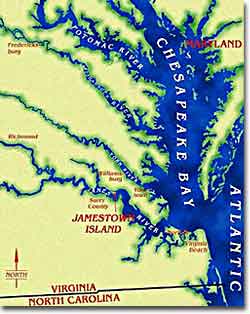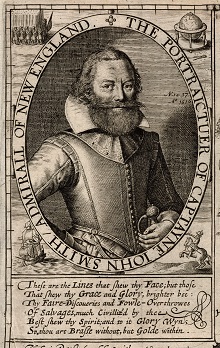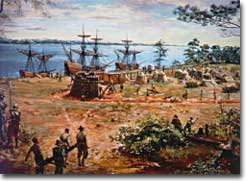what motivated colonists to settle in jamestown, plymouth, rhode island or philadelphia?

2c. Jamestown Settlement and the "Starving Time"

Jamestown, Virginia, was the site of the first permanent English settlement in the Americas. The settlers chose a location close to the h2o, hoping to found a thriving community.
The first joint-stock company to launch a lasting venture to the New World was the Virginia Company of London. The investors had one goal in listen: gold. They hoped to repeat the success of Spaniards who found golden in S America.
In 1607, 144 English men and boys established the Jamestown colony, named later on King James I.
The colonists were told that if they did non generate any wealth, financial support for their efforts would cease. Many of the men spent their days vainly searching for gilt.
As a event, the colonists spent little time farming. Food supplies dwindled. Malaria and the harsh wintertime besieged the colonists, equally well. After the first year, merely 38 of the original 144 had survived.
Starting time Virginia Charter
James, past the grace of God [King of England, Scotland, French republic, and Ireland, Defender of the Faith], etc.
Whereas our loving and weldisposed subjects ... and divers others of our loving subjects, accept been apprehensive sutors unto united states that wee woulde vouchsafe unto them our licence to make habitacion, plantacion and to deduce a colonie of sondrie of our people into that parte of America normally called Virginia, and other parts and territories in America either appartaining unto usa or which are not nowe actuallie possessed past anie Christian prince or people, scituate, lying and beingness all along the sea coastes between fower and thirtie degrees of northerly latitude from the equinoctiall line and 5 and fortie degrees of the same latitude and in the maine lande betweene the aforementioned fower and thirtie and v and fourtie degrees, and the ilandes thereunto adjacente or within one hundred miles of the coaste thereof;
And to that ende, and for themore speedy accomplishemente of theire saide intended plantacion and habitacion at that place, are desirous to devide themselves into two severall colonies and companies, the one consisting of certaine Knightes, gentlemen, marchanntes and other adventurers of our cittie of London, and elsewhere, which are and from time to time shalbe joined unto them which doe want to begin theire plantacions and habitacions in some fitt and conveniente place betwixt fower and thirtie and one and fortie degrees of the said latitude all alongest the coaste of Virginia and coastes of America aforesaid and the other consisting of sondrie Knightes, gentlemen, merchanntes, and other adventurers of our citties of Bristoll and Exeter, and of our towne of Plymouthe, and of other places which doe joine themselves unto that colonie which doe desire to beginn theire plantacions and habitacions in some fitt and convenient place betweene eighte and thirtie degrees and five and fortie degrees of the saide breadth all alongst the saide coaste of Virginia and America as that coaste lieth;
Wee, greately commending and graciously accepting of theire desires to the furtherance of soe noble a worke which may, by the providence of Almightie God, hereafter tende to the glorie of His Divine Majestie in propagating of Christian organized religion to suche people equally nevertheless live in darkenesse and miserable ignorance of the true knoweledge and worshippe of God and may in tyme bring the infidels and salvages living in those parts to humane civilitie and to a setled and quiet govermente, doe by theise our lettres patents graciously accepte of and agree to theire apprehensive and well intended desires;
April 10, 1606
"Piece of work or Starve"
The colony may well take perished had it not been for the leadership of John Smith. He imposed strict discipline on the colonists. "Work or starve" was his motto, and each colonist was required to spend 4 hours per day farming.

The xx of April. Beingness at work, in hewing down Copse, and setting Corn, an alarum caused us with all speed to take our arms, each expecting a new attack of the Savages: but understanding it a Boat under sail, our doubts were soon satisfied with the happy sight of Principal Nelson, his many perils of extreme storms and tempests, his send well as his company could testify, his intendance in sparing our provision was well: but the providence thereof, as also of our stones, Hatchets and other tools (but ours excepted) which of all the residuum was about necessary: which might inforce united states to thinke either a seditious traitor to our activeness, or a most unconscionable deceiver of our treasures.
– John Smith, "A True Relation of Occurrences and Accidents in Virginia" (1608)

An early abet of tough love, John Smith is remembered for his strict leadership and for saving the settlement from starvation.
An accidental gunpowder fire forced Smith to return to England in 1609. After his departure, the colony endured fifty-fifty more hardships. A new boatload of colonists and supplies sank off the declension of Bermuda on its way to help the hungry settlement. The wintertime of 1609-x, known equally the "starving time," may have been the worst of all.
Disease and hunger ravaged Jamestown. Two desperate colonists were tied to posts and left to starve equally punishment for raiding the colonies' stores. I colonist even took to cannibalism, eating his own wife. The fate of the venture was precarious. Yet still more colonists arrived, and their numbers included women.

Pictured are the three ships that brought the original settlers to Jamestown in 1607: the Susan Constant, the Godspeed, and the Discovery.
Despite the introduction of tobacco cultivation, the colony was a failure as a financial venture. The king alleged the Virginia Company bankrupt in 1624.
About 200,000 pounds were lost among the investors. The charter was thereby revoked, and Virginia became a imperial colony, the kickoff in America to be ruled past the Crown.
Investments in permanent settlements were risky indeed. The merchants and gentry paid with their pocketbooks. Many colonists paid with their lives. For every six colonists who ventured across the Atlantic, only 1 survived.

![]()
If you similar our content, delight share information technology on social media!

![]()
Source: https://www.ushistory.org/us/2c.asp
0 Response to "what motivated colonists to settle in jamestown, plymouth, rhode island or philadelphia?"
Post a Comment